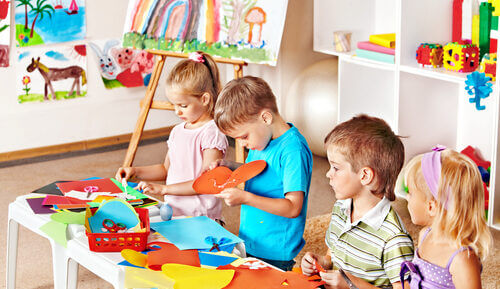
Table of contents
- What are the Minimum Standards in Northern Ireland?
- Who regulates childcare standards in Northern Ireland?
- The Minimum Standards for childcare
- Quality of care
- 'Safety promoted at all times'
- Quality of staffing, management and leadership
- Quality of the physical environment
- Quality of monitoring and evaluation
- Always check nursery inspection reports
Table of contents
- What are the Minimum Standards in Northern Ireland?
- Who regulates childcare standards in Northern Ireland?
- The Minimum Standards for childcare
- Quality of care
- 'Safety promoted at all times'
- Quality of staffing, management and leadership
- Quality of the physical environment
- Quality of monitoring and evaluation
- Always check nursery inspection reports
As a parent or guardian, you want the best for your child. To ensure your child receives high quality care, nurseries and other childcare providers must adhere to the Minimum Standards in Northern Ireland. This page outlines the childcare standards in Northern Ireland that you should expect when using a nursery or other childcare setting in Northern Ireland.
What are the Minimum Standards in Northern Ireland?
The Minimum Standards in Northern Ireland outline the minimum level of service that childcare settings must provide to be allowed to operate. The standards must be met before a childcare provider for children under the age of 12 can be registered with a Health and Social Care (HSC) Trust.
There are 16 standards which providers must adhere to. These are grouped under four headings:
- Quality of care
- Quality of staffing, management and leadership
- Quality of the physical environment
- Quality of monitoring and evaluation
A fifth heading covers the policies and procedures each setting is required to follow.
The Minimum Standards have been developed to ensure parents get a consistent level of quality and approach to registration and inspection. All childcare services are measured against the same benchmark.
Many nurseries offer a service which is above this minimum, and strive to continually improve. The standards aim to raise the quality of childcare provision everywhere in Northern Ireland.
Who regulates childcare standards in Northern Ireland?
In Northern Ireland, early years settings are regulated by Early Years Teams. These are teams of social workers within each Health and Social Care Trust.
The Early Years Teams are responsible for the registration, inspection, monitoring and support of day care providers, childminders and sessional day care:
- Day nurseries
- Playgroups
- Out-of-school care
- Childminders
- Summer and holiday schemes
- Crèches
The Early Years Teams provide a quality assurance system for families, checking the suitability and safety of premises, suitability of staff, the standards of care and the suitability of equipment used.
Their findings are made publicly available through inspection reports, which ensures parents and guardians can make informed decisions about their child’s care.
The Minimum Standards for childcare
The childcare standards in Northern Ireland are underpinned by eight principles that managers and staff should adhere to.
- Dignity and respect
- Independence
- Rights
- Equality and diversity
- Choice
- Privacy
- Fulfilment
- Confidentiality
Below is a summary of the Minimum Standards:
Quality of care
1. Children are safeguarded through systems and practices that are consistent with the Regional Child Protection Policies and Procedures. For example, at full day care services, a staff member with responsibility for safeguarding and child protection must be appointed and available during service provision.
2. Children’s wellbeing is promoted and their care, developmental and play needs are met. A wide range of play and other activities is provided to develop children’s physical, social, emotional and intellectual abilities. For example, children should have appropriate opportunities to be active both indoors and outdoors. Their views should be sought and their interests taken into account.
3. The overall health and well being of the child is promoted and safeguarded. For example, good hygiene is practiced and promoted. Premises and equipment are always clean. There must be at least one member of staff with up-to-date paediatric first aid training present at all times.
‘Safety promoted at all times’
4. Children safety is promoted at all times ensuring that proper precautions are taken to prevent accidents and minimise risks to them. For example, settings must comply with health and safety regulations and guidance. No alcohol is allowed to be kept on premises.
5. Children are provided with a variety of nutritious foods and drinks that will contribute to their health, growth and development. For example, children’s nutritional needs should be met by including foods from the four main food groups. Food and drink must meet each child’s dietary, cultural and religious requirements.
6. There is consistency in the use of positive strategies to establish acceptable patterns of behaviour and to promote children’s wellbeing, self-esteem and development. For example, positive behaviour is encouraged and children’s social and emotional development are promoted.
7. Providers work with parents to meet the needs of children. For instance, each setting has a statement of purpose setting out information for parents and appropriate action is taken in response to parents’ wishes and concerns.
8. The setting actively promotes equality of opportunity and inclusion for all children, parents and staff and positively values diversity. For example, all children, staff and adults are treated with equal worth, respect and value.
9. The inclusion, welfare and development of children who have additional needs are actively promoted. This is based on appropriate assessment. For example, if a child is identified as having additional needs, this should sensitively be discussed with parents. Parents should be encouraged to seek help.
Quality of staffing, management and leadership
10. There are effective and efficient management and monitoring in the setting to support the work of staff and the care of children. For example, the registered person must ensure staff are employed in sufficient numbers. They must have the relevant qualifications to meet statutory requirements. In day nurseries, 50 per cent of staff must have a childcare qualification.
11. Adult/child ratios, space and resources are organised to meet the children’s needs effectively. They must comply with the stipulations on the Registration Certificate. For example, the registered person ensures that there is a suitably qualified person in charge and on site at all times. In day care, each child must be allocated a key worker.
Day care staff ratios:
- Age 0-2: one carer to three children
- Age 2-3: one carer to four children
- Age 3-5: One carer to eight children
Childminder staff ratios:
- One adult per six children under 12, of whom no more than three are under compulsory school age
- Normally no more than one child under a year old
12. Those working with children in either a paid or voluntary capacity, or who have substantial access to them, are suitable individuals to do so.
For example: Those working with children or who have substantial access to them must have Enhanced Disclosure vetting checks completed.
Quality of the physical environment
13. Sufficient furniture, play equipment and materials are provided. These are appropriate for their purpose and help create an accessible and stimulating environment. For example, play equipment and materials should be age-appropriate and accessible to all children.
14. The premises are safe, secure and suitable for their purpose and meet relevant statutory requirements. For example, there should be clear and defined play areas which are large enough for free movement. Where outside play is not available, children should be taken regularly to local parks, playground or the equivalent.
Room temperature should be between 18-21 degrees Celsius.
Quality of monitoring and evaluation
15. Records are managed in accordance with legislative requirements and the setting’s records management policy. For example, all records, including those related to children and staff, must be available for inspection by the Trust’s Early Years Team.
16. All complaints are taken seriously and dealt with promptly and effectively. For example, the setting’s complaints policy should be published and made available to parents. Steps should be taken to resolve complaints.
Always check nursery inspection reports
Before selecting a nursery for your child, check the setting’s inspection report. This will indicate how the nursery operates and whether it is in line with the Minimum Standards.
Always check the inspection reports published by the Early Years Teams.
Inspection reports are listed on The Education and Training Inspectorate’s website.
Choosing the right nursery for your child can be difficult. You can read this guide to finding a nursery, which includes questions to ask a nursery.


